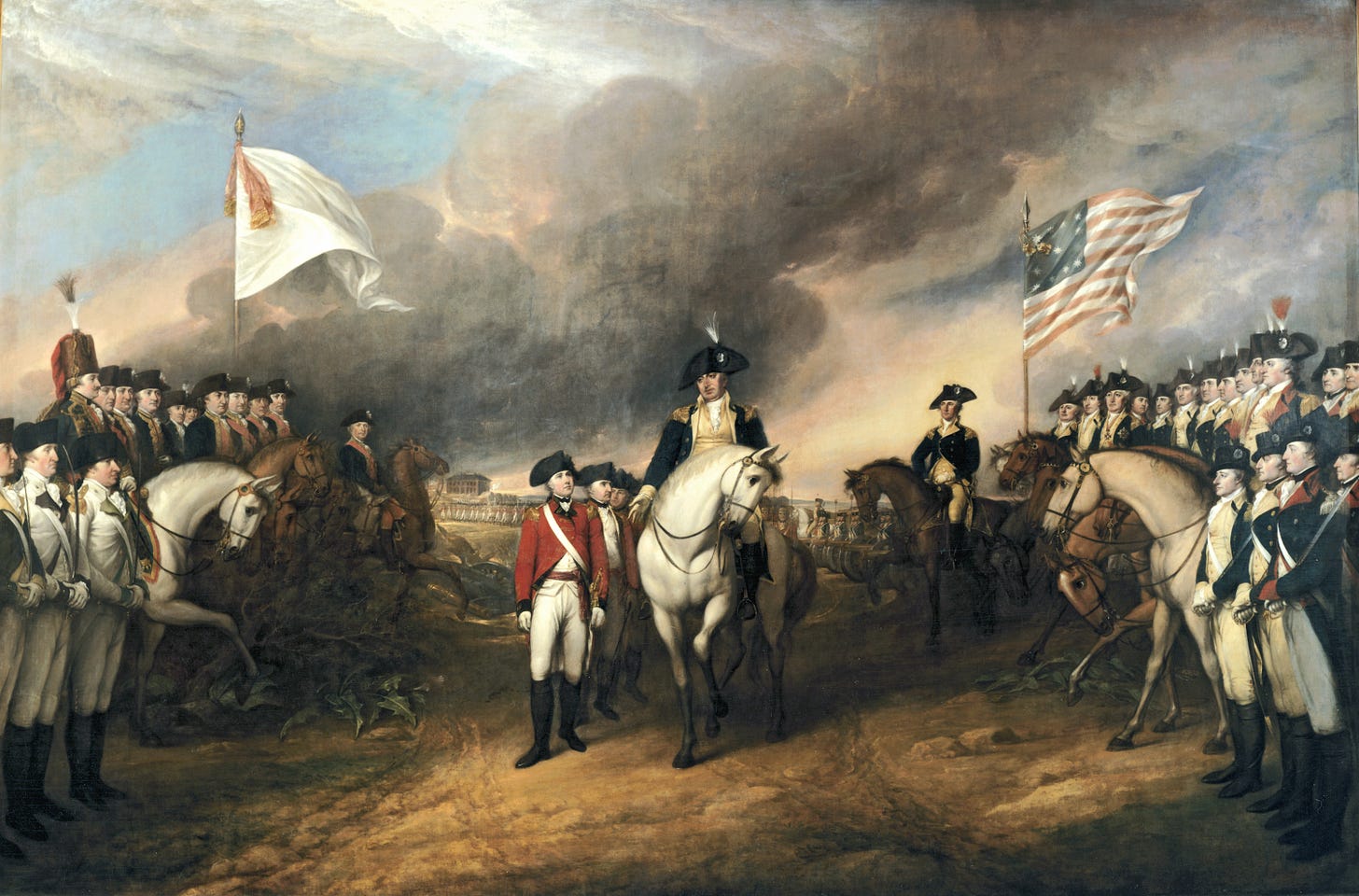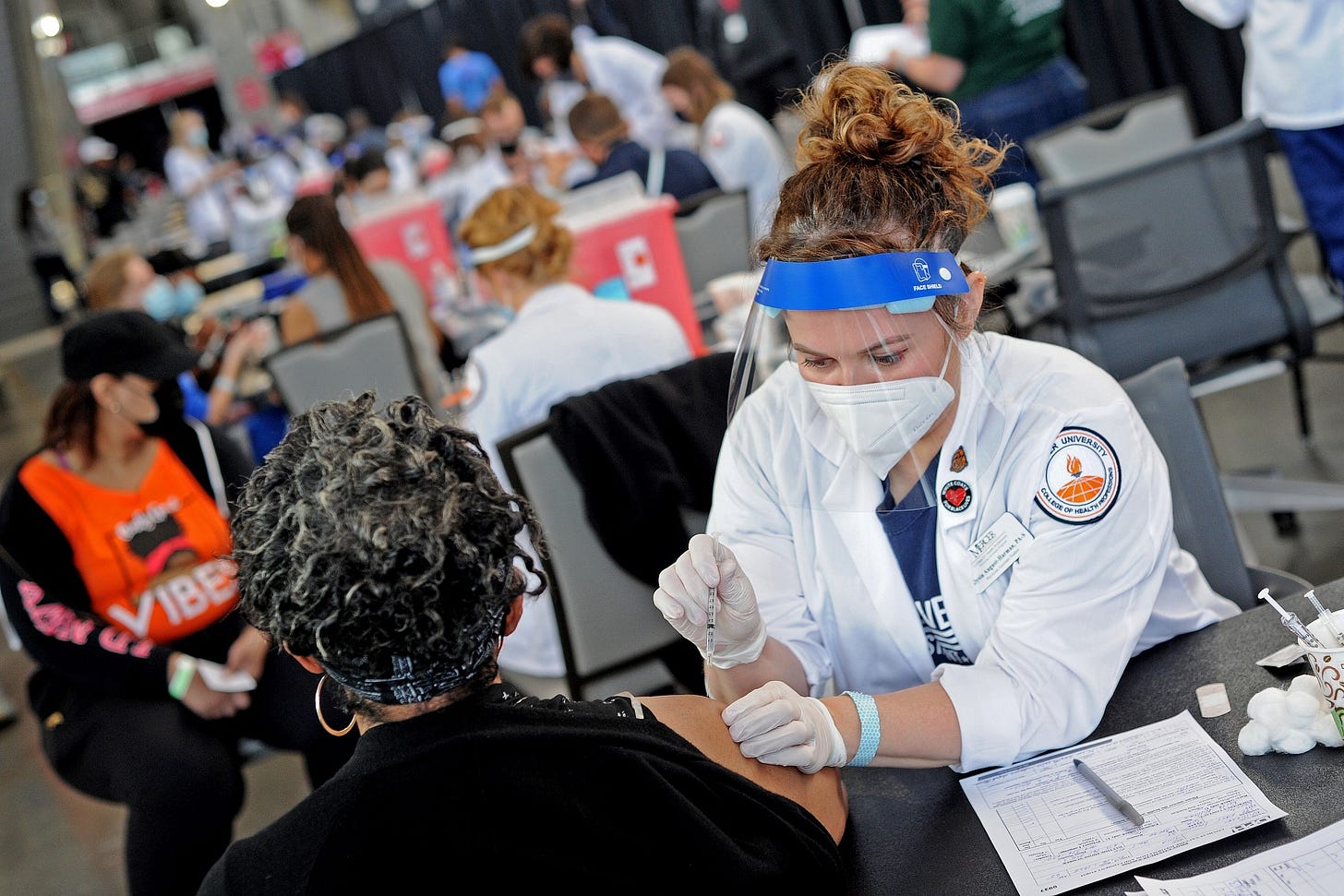Once in a lifetime
American crises come every 80 years – 1781, 1861, 1941, 2021
Every 80 years - in 2021, 1941, 1861, and 1781 - America has faced a crisis. Each crisis changed our economy and our society in deep and long-lasting ways, that forever afterwards split our memories of the past into “before” and “after” the crisis. Each was caused by our changing position in the world, and by contradictions between our long-standing values and emerging facts. The result of each was a victory, but also fundamental changes in our economy, our way of life, and our place among nations. Our current pandemic is only the most recent example, but it, too, will change America forever.
These crises come along every 80 years, “once in a lifetime”, for a reason. It takes a lifetime for America to change, for our compromises, contradictions, and conflicts to come to a head.
In 1781, the Revolutionary War was caused by the contradiction between our demanding our rights ‘as Englishmen’ and the king’s treating us as colonists without a say. Subjects of an English king had defined rights. Did we lose those rights simply because we were born 3,000 miles across the sea? Were we to suffer “taxation without representation?” It took a war to settle the question.
In 1861, the Civil War came because of the contradiction between the Declaration of Independence’s promise that “all men are created equal” and the Constitution’s compromise on that principle. The two couldn’t co-exist and, finally, we came to blows.
In 1941, our involvement in World War II arose because of the conflicting tensions between our safe home between two giant oceans and our increasing power in world affairs. George Washington had warned us to “steer clear of permanent alliance,” while Thomas Jefferson had urged us to accept “entangling alliances with none.” As the world’s rising industrial superpower, we tiptoed into more conflicts and more entanglements, with dictatorships and with their victims, eventually being dragged into war because we couldn’t stay out.
In 2021, we again faced a crisis, one we are pulled into because of the contradictions between a free and open world of global trade, easy travel, and American dominance, on one hand, and the vulnerability of human biology on the other.
We’ve suffered through epidemics before. But there wasn’t much that we could do in the past, so there wasn’t much that we did do, and too many Americans died each time.
We are now an extremely wealthy, advanced nation. In the past 80 years, we’ve become more empathetic and sensitive to the sufferings of others to a degree prior generations wouldn’t recognize. And we’ve progressed orders of magnitude in our understanding of diseases and cures. As a result, we’ve taken a different course this time, choosing to fight the pandemic rather than suffer it passively. We’re no longer willing to compromise with Mother Nature.
The Revolutionary War, the Civil War, World War 2, and the pandemic are 80 years apart for a reason; it isn’t just some exercise in nutty numerology. Eighty years is the lifespan of a human being, and therefore the limit of personal memory and experience.
Generations come and go. After eighty years, the original people who gathered the facts, struggled with the debate, and made the decisions, are all dead and gone. New generations come along and don’t accept the compromises and deceptions of the past; don’t understand the reasons behind their warnings or their values. We bury wisdom in its grave, only to retrace the path to its errors.
That’s why the length of a human lifetime is meaningful for our history.
It’s the reason why Lincoln used the biblical cadence at Gettysburg, “Four score and seven years ago” instead of saying “It was just 87 short years ago.”
He purposely connected his era to the people a lifetime before by alluding to the Bible verse: “The days of our years are three score years and ten; and if by reason of strength they be four score years, yet is their strength labor and sorrow.”
Lincoln’s profound phrasing made a point that echoes through the ages: it takes a lifetime to change America.
With each of these crises, each of these lifetimes, we became a new nation, a different society, an altered people. With each, life changed so dramatically that we speak of “pre-war” and “post-war” in economics, art, architecture, literature, music, entertainment, politics, and society.
After 1781, 1861 and 1941, with new technologies invented, old restrictions swept away and forgotten, and a chance to remake the American economy at hand, America exploded with economic growth and opportunity.
After 2021, after we bring the pandemic to an end, we’ll see a similar permanent change in our way of life, and an economic boom to rival the ages.
Work-from-home, work-remotely, and work-from-anywhere have proven popular and productive at the largest scale imaginable during this crisis. Companies changed from measuring face time in the office to measuring the output of their white-collar workforce in a way that was impossible to do just two years ago.
Removing geographical restrictions on human capital, and thereby maximizing its productivity, will grow our economy faster, making it more productive and more efficient. It simply can’t be emphasized enough how this changes the game for America forever.
Opening all white-collar jobs to all professionals, anywhere in the country, unleashes the skills and talents of every American professional. It enables them to contribute to the best of their ability, in the job where they are most effective, regardless of location. For each person, that means their highest value won’t be limited by how far they can commute on the highway in the morning. Multiply this by 110 million white-collar workers and the increase in our productivity will be breathtaking.
It will take five to ten years for the new remote workplace to be fully reflected in our hiring and staffing practices, but the result will be faster economic growth for decades to come. America’s egalitarian, flexible, and self-reliant style of work is perfectly situated among nations to take advantage of this phenomenon.
I will share research from Ladders on Wednesday that demonstrates this transition is happening right now, can’t be reversed, and is in fact picking up speed.
The post-pandemic world will also change small town America, our homes and our communities. We’ve been emptying out our small towns for almost a century now. For many, it was a trade-off and a necessary evil. They preferred the small town lifestyle, but needed the big city income. If you wanted to be a big-time professional, you had to move to the big-time cities. But now, with our new remote working arrangements, ambition can find its level in Buffalo, Boise and Baton Rouge as easily as in Boston or the Big Apple.
In the next 80 years, talented Americans will move back to, or never leave, their hometowns. What happens when these highly-skilled, highly-educated professionals are back in the daily life of small town America? What happens to the school board, local charities, civic organizations, cultural offerings, job training and career mentorship when these leading citizens are participants in small town life? They will all be transformed, in ways we can’t even begin to predict.
It is the largest change in our work and social lives since World War II. As much as we’ve heard about remote work, it is under-hyped and under-appreciated how radically it will alter American society.
In summary, crises have remade America every 80 years - in 2021, 1941, 1861, and 1781 (and yes, if you go backwards two additional lifespans, you’ll find that the Pilgrims’ desperate fight against Winter and the First Thanksgiving occurred in… 1621.)
It’s less of a mystical numbers racket, though, and more of a reflection of the lifespan of a human being, and how long it takes a country to address its conflicts, compromises, and contradictions. After we succeed in defeating the pandemic, we’ll see an economic boom for decades to come, and a fundamental change in our way of life.
Yet again, a once-in-a-lifetime crisis is remaking America, and you’re a part of the history.




One of the most thoughtful pandemic articles I’ve read in the last two years. Thank you
These are moments in time in the collective consciousness. Where we are, is where we are; & not by coincidence. We each have our role to play. Remote work is revolutionizing the way we go about our daily lives; for some. For those who hold the hand of a dying mother, brother, sister or father, for those who stock shelves at 3am so we may shop at 6, for those who clean the snow from our expressways so our toilet paper & food make it to where we shop, you are not forgotten. Let us be mindful of every contribution made in this fog of a pandemic. It is the only way to shed light when & where needed.